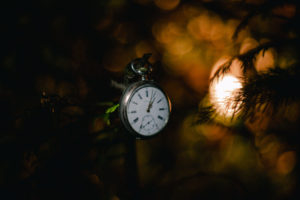Since the start of the Covid-19 pandemic, my sense of time has been distorted. In many ways, the past ten months have been the longest of my life. Social isolation protocols mean that I’ve missed friends and family, the ability to travel freely, and simple pleasures like having a coffee at my favorite café. Paradoxically, it also seems the weeks fly by. Maybe it’s the unprecedented nature of it all, the drastic changes in our ways of working, socializing, worshipping and processing loss, that make time seem to speed up. This slowing-down-yet-speeding-up is an unforeseen effect of the pandemic.
In his New York Times article, How 2020 Became the Year of Blur, Alex Williams shares my bewilderment and reassures me I’m not alone. Consulting numerous experts, Williams says the time warp we have experienced over the past months is due to several factors: a lack of usual events to help mark time, stress, monotony, isolation, exhaustion, lack of “real life” stimulation when working remotely, and the overwhelming number of seemingly endless crises this year: “a killer virus blended with political chaos, environmental catastrophe, racial strife.”
It’s a lot to take in.
But when I allowed myself to pause and consider it, the shift in how I’ve experienced time this year made a lot more sense. Further, it made me think more deeply about the nature of time itself, and the opportunities I might have to more fully and clearly experience “a time for every purpose under heaven.”
When teaching courses in women’s and gender studies and history, I often spoke with students about the limitations in the way many of us think about time. Western settler cultures prize a linear model of time in which days, months, years, decades, and centuries march endlessly forward, and the passage of time is measured in achievements. Whether our goals are economic prosperity, intellectual or physical development, artistic creation, or spiritual growth, many North Americans see achievement as a sign of progress. We pin gold stars on the victories of human innovation. While striving to be our best selves, amassing ever more material goods, and bettering our communities are not meaningless goals in and of themselves, deeming the relentless pursuit of these ends the sole measure of progress reflects a limited way of thinking about time. It also suggests that an ever-increasing pace is the only way to get ahead, to achieve success, to matter.
Western settler cultures prize a linear model of time … and the passage of time is measured in achievements.
In this way of thinking, the time of those whose lives do not adhere to a strictly linear measure of time is devalued. The reproductive and emotional labor of women—often repetitive and unpaid—is overlooked. Indigenous peoples, whose traditional ways often embed a cyclical view of time, are stereotyped as backward and unable to adapt to modernity. Those pushed to the margins of the mainstream economy—people who are disabled, poor, or addicted—are accused of wasting time and resources. Linear time is not on their side.
It is difficult to make sense of the many inconsistencies and injustices in the way we value and spend time, particularly during these trying times. I try to pause and remember that the consequences of the pandemic time warp are much greater for some than others. I have three elderly relatives who live in long-term care homes. Although compassionate caregivers have done their very best to explain visitor restrictions, limitations on recreational activities, additional PPE and testing protocols, and numerous other changes to day-to-day routines, it’s not always easy for the elderly to adjust to this “new normal.” Hope is low and anxieties run high. We make the best of Zoom calls and window visits, but the space-time divide seems so wide right now. For now, it is enough to keep going moment by moment, navigating the time warp as best we can.
I try to pause and remember that the consequences of the pandemic time warp are much greater for some than others.
These blurry days are hard, and I long for a time when life returns to a more normal state. But even when pandemic restrictions are lifted, I hope my perceptions of time don’t return to normal as well—at least not fully. I want to remember the value of nonlinear time and refuse to allow an ever-increasing pace to dictate life’s meaning and purpose. Increased mindfulness of time’s passing and its effects on others might lead to greater empathy and understanding—valuable assets in our quests for spiritual growth, intercommunity dialogue, and social justice.
After the pandemic, I want to … refuse to allow an ever-increasing pace to dictate life’s meaning and purpose.
Like this post? Subscribe to have new posts sent to you by email the same day they are posted.




Leave a Reply